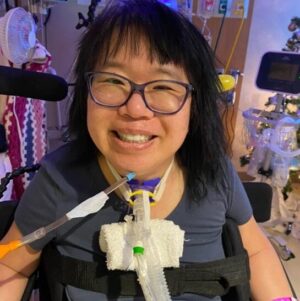As a college freshman, Kate Strickland was struck by a car while riding her bike. The accident left her paralyzed from the chest down and unable to use her hands or wrists. Unable to find a caregiver to fit Kate’s needs, her mother, Jenie, stepped up to fulfill the role, living with Kate in her dorm and attending classes with her at the University of Texas at Austin as she resumed her studies. In honor of National Family Caregivers Month, Kate told us her story.
When you searched for a caregiver, what were some of your criteria?
We were looking for a caregiver or a group of caregivers who could be with me 24/7. Ideally, the caregiver would have a CNA [Certified Nursing Assistant] certification and be near my age in order to go with me to classes on campus. We needed somebody who would be comfortable getting me ready in the mornings, which includes helping with showers, a bowel program and catheter bags.
How does your mother serve as a caregiver for you?
My mom has been my caregiver in everything that I have needed since my accident. She showers me, does the bowel program, dresses me, feeds me and brushes my teeth. She does everything for me. She also goes to my classes and takes notes for me. It’s been very helpful to have my mother fill this role. Without her, I wouldn’t be able to go to school.

Kate (center) and her mother (left)
Has caregiving changed the relationship between you and your mom?
I think it’s changed our roles more than our overall relationship. Instead of just being mother and daughter, we are now caregiver and dependent. We spend all day, every day, with each other. Before my injury, I was independent at college and I wasn’t even talking to my parents every single day.
Is it difficult to explain to other people why your mom is always with you?
For the most part, I think it is fairly obvious why my mother is with me. It’s difficult to hide that I have a disability since I am in a massive power wheelchair. However, I think having my mother with me all the time changes the experience of making new friends in college. A lot of my peers feel like parents intrude on their college independence, so it’s an adjustment for them to understand my situation.
Can it be stressful to rely on someone else to help you?
Of course it’s stressful to rely on someone else – before my injury, I was always a very independent person. But, the fact is, if I don’t rely on someone else to help me, I won’t be able to do things like attend school, do my homework or even eat, so I have become accustomed to my total dependence on others.
What one word would you choose to describe caregiving?
The one word I’d use to describe caregiving is complicated.
Do you have any advice for another student who is learning to accept care after injury?
This may sound harsh, but what it comes down to is this: you can either accept your injury and your limitations, even though they are obviously not ideal, and receive the help you need to move on with your life, or you can refuse reality and help to just sit around staying stagnant.

“Receive the help you need to move on with your life,” Kate advises.
Have you had to adjust to college life with a caregiver? Share your story with us on Facebook or on Twitter.
As a college freshman, Kate Strickland was struck by a car while riding her bike. The accident left her paralyzed from the chest down and unable to use her hands or wrists. Unable to find a caregiver to fit Kate’s needs, her mother, Jenie, stepped up to fulfill the role, living with Kate in her dorm and attending classes with her at the University of Texas at Austin as she resumed her studies. In honor of National Family Caregivers Month, Kate told us her story.
When you searched for a caregiver, what were some of your criteria?
We were looking for a caregiver or a group of caregivers who could be with me 24/7. Ideally, the caregiver would have a CNA [Certified Nursing Assistant] certification and be near my age in order to go with me to classes on campus. We needed somebody who would be comfortable getting me ready in the mornings, which includes helping with showers, a bowel program and catheter bags.
How does your mother serve as a caregiver for you?
My mom has been my caregiver in everything that I have needed since my accident. She showers me, does the bowel program, dresses me, feeds me and brushes my teeth. She does everything for me. She also goes to my classes and takes notes for me. It’s been very helpful to have my mother fill this role. Without her, I wouldn’t be able to go to school.

Has caregiving changed the relationship between you and your mom?
I think it’s changed our roles more than our overall relationship. Instead of just being mother and daughter, we are now caregiver and dependent. We spend all day, every day, with each other. Before my injury, I was independent at college and I wasn’t even talking to my parents every single day.
Is it difficult to explain to other people why your mom is always with you?
For the most part, I think it is fairly obvious why my mother is with me. It’s difficult to hide that I have a disability since I am in a massive power wheelchair. However, I think having my mother with me all the time changes the experience of making new friends in college. A lot of my peers feel like parents intrude on their college independence, so it’s an adjustment for them to understand my situation.
Can it be stressful to rely on someone else to help you?
Of course it’s stressful to rely on someone else – before my injury, I was always a very independent person. But, the fact is, if I don’t rely on someone else to help me, I won’t be able to do things like attend school, do my homework or even eat, so I have become accustomed to my total dependence on others.
What one word would you choose to describe caregiving?
The one word I’d use to describe caregiving is complicated.
Do you have any advice for another student who is learning to accept care after injury?
This may sound harsh, but what it comes down to is this: you can either accept your injury and your limitations, even though they are obviously not ideal, and receive the help you need to move on with your life, or you can refuse reality and help to just sit around staying stagnant.

Have you had to adjust to college life with a caregiver? Share your story with us on Facebook or on Twitter.











